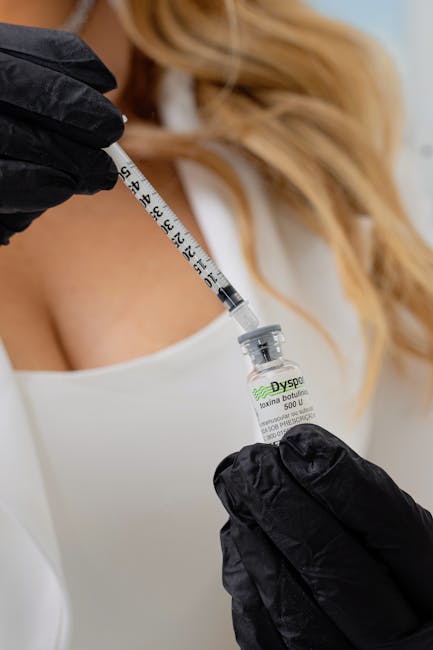Exploring the Impact of Botox Treatment on Self-Esteem
In today’s aesthetically driven society, the pursuit of beauty and youth is more prevalent than ever. Among the myriad of cosmetic procedures available, Botox has emerged as a popular choice for those looking to enhance their appearance and, as a result, their self-esteem. But does Botox truly deliver on the promise of boosting one’s self-worth? In this blog post, we will explore the impact of Botox treatment on self-esteem, examining the psychological effects, relevant statistics, and offering actionable tips for those considering this procedure.
Understanding Botox: More Than Just a Cosmetic Procedure
Botox, short for Botulinum Toxin, is a neurotoxic protein used primarily to reduce the appearance of facial wrinkles. Initially developed for medical purposes, it has gained immense popularity as a cosmetic treatment due to its effectiveness in creating a more youthful appearance. According to the American Society of Plastic Surgeons, over 7.5 million Botox procedures were performed in 2020 alone, underscoring its widespread appeal.
The Psychological Link Between Appearance and Self-Esteem
Our physical appearance has a profound impact on our self-esteem and mental well-being. Research indicates that individuals who perceive themselves as attractive often experience higher levels of confidence and self-worth. Conversely, those who are dissatisfied with their looks may suffer from low self-esteem, impacting their social interactions and overall quality of life.
In a study published in the Journal of Cosmetic Dermatology, participants who underwent Botox treatment reported significant improvements in their self-esteem and body image. This suggests that cosmetic procedures can have a positive psychological effect, enhancing one’s perception of themselves and their confidence in social situations.
Botox and Self-Esteem: A Statistical Insight
Statistics reveal a compelling link between Botox treatments and improved self-esteem. A survey conducted by the American Academy of Facial Plastic and Reconstructive Surgery found that 92% of individuals who received Botox reported feeling more confident post-treatment. This boost in confidence often translates to increased social engagement and a more positive outlook on life.
Moreover, a study published in the Journal of Clinical and Aesthetic Dermatology highlighted that 80% of Botox recipients felt more attractive, suggesting a direct correlation between a youthful appearance and enhanced self-esteem. Such findings underscore the transformative potential of Botox in fostering self-assurance and a positive self-image.
Real-Life Examples: Botox Transformations
Consider the case of Sarah, a 45-year-old professional who struggled with low self-esteem due to prominent forehead lines. After seeking Botox treatment, Sarah experienced not only a smoother complexion but also a newfound confidence that positively impacted her career and personal relationships. Her story is just one of many that illustrate the transformative power of Botox on self-esteem.
The Role of Social Perception
In addition to personal feelings of attractiveness, social perception plays a crucial role in self-esteem. A study from the University of Toronto revealed that individuals who received Botox were often perceived as more approachable and trustworthy by others. This enhanced social perception can lead to more positive interactions and, in turn, a boost in self-esteem.
It’s important to note that while Botox can enhance self-esteem for many, it is not a universal solution. Self-esteem is influenced by a myriad of factors, including personal achievements, relationships, and mental health. For some, addressing these areas in conjunction with cosmetic procedures may yield the most comprehensive improvements.
Actionable Tips for Considering Botox
For those contemplating Botox treatment as a means to boost self-esteem, here are some actionable tips to ensure a positive experience:
1. Conduct Thorough Research
Before committing to Botox, educate yourself about the procedure, potential side effects, and expected outcomes. Understanding the process will help set realistic expectations and alleviate any anxiety associated with the treatment.
2. Choose a Qualified Practitioner
Select a licensed and experienced practitioner to administer Botox. A skilled professional will ensure the procedure is performed safely and effectively, minimizing the risk of complications.
3. Set Realistic Expectations
While Botox can significantly enhance appearance, it’s crucial to maintain realistic expectations. Understand that the treatment may not completely eliminate all wrinkles or guarantee a dramatic change in self-esteem.
4. Consider Complementary Therapies
Combine Botox with other self-esteem boosting activities, such as exercise, therapy, or mindfulness practices. These complementary therapies can enhance overall well-being and amplify the positive effects of Botox on self-esteem.
Conclusion: Finding Confidence Through Botox
In conclusion, Botox treatment can be a powerful tool for enhancing self-esteem and confidence. The psychological benefits, supported by compelling statistics and real-life examples, highlight its potential to positively impact one’s self-image and social interactions. However, it’s essential for individuals to approach Botox with informed expectations and to consider holistic strategies for boosting self-esteem. By doing so, they can achieve a more balanced and fulfilled sense of self, complemented by the aesthetic benefits of Botox.
Ultimately, the decision to undergo Botox treatment should be guided by personal goals and a desire for self-improvement. As with any cosmetic procedure, it’s crucial to prioritize safety, seek professional advice, and embrace a holistic approach to self-esteem enhancement.

